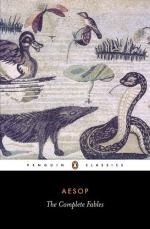THE GRASSHOPPER AND THE ANTS
One fine day in winter some Ants were busy drying their store of corn, which had got rather damp during a long spell of rain. Presently up came a Grasshopper and begged them to spare her a few grains, “For,” she said, “I’m simply starving.” The Ants stopped work for a moment, though this was against their principles. “May we ask,” said they, “what you were doing with yourself all last summer? Why didn’t you collect a store of food for the winter?” “The fact is,” replied the Grasshopper, “I was so busy singing that I hadn’t the time.” “If you spent the summer singing,” replied the Ants, “you can’t do better than spend the winter dancing.” And they chuckled and went on with their work.
THE FARMER AND THE VIPER
One winter a Farmer found a Viper frozen and numb with cold, and out of pity picked it up and placed it in his bosom. The Viper was no sooner revived by the warmth than it turned upon its benefactor and inflicted a fatal bite upon him; and as the poor man lay dying, he cried, “I have only got what I deserved, for taking compassion on so villainous a creature.”
Kindness is thrown away upon the evil.
THE TWO FROGS
Two Frogs were neighbours. One lived in a marsh, where there was plenty of water, which frogs love: the other in a lane some distance away, where all the water to be had was that which lay in the ruts after rain. The Marsh Frog warned his friend and pressed him to come and live with him in the marsh, for he would find his quarters there far more comfortable and—what was still more important—more safe. But the other refused, saying that he could not bring himself to move from a place to which he had become accustomed. A few days afterwards a heavy waggon came down the lane, and he was crushed to death under the wheels.
THE COBBLER TURNED DOCTOR
A very unskilful Cobbler, finding himself unable to make a living at his trade, gave up mending boots and took to doctoring instead. He gave out that he had the secret of a universal antidote against all poisons, and acquired no small reputation, thanks to his talent for puffing himself. One day, however, he fell very ill; and the King of the country bethought him that he would test the value of his remedy. Calling, therefore, for a cup, he poured out a dose of the antidote, and, under pretence of mixing poison with it, added a little water, and commanded him to drink it. Terrified by the fear of being poisoned, the Cobbler confessed that he knew nothing about medicine, and that his antidote was worthless. Then the King summoned his subjects and addressed them as follows: “What folly could be greater than yours? Here is this Cobbler to whom no one will send his boots to be mended, and yet you have not hesitated to entrust him with your lives!”




